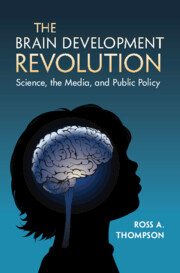Book contents
- The Brain Development Revolution
- The Brain Development Revolution
- Copyright page
- Contents
- Figures
- Preface
- Chapter 1 Science Does Not Speak for Itself
- Chapter 2 The Supreme Court Considers Adolescence
- Chapter 3 Dispatches from the Laboratory
- Chapter 4 I Am Your Child
- Chapter 5 “Follow the Science”
- Chapter 6 Framing Developmental Science
- Chapter 7 Who Speaks for Developmental Science?
- Notes
- Works Cited
- Index
- About the Author
Chapter 6 - Framing Developmental Science
Published online by Cambridge University Press: 24 August 2023
- The Brain Development Revolution
- The Brain Development Revolution
- Copyright page
- Contents
- Figures
- Preface
- Chapter 1 Science Does Not Speak for Itself
- Chapter 2 The Supreme Court Considers Adolescence
- Chapter 3 Dispatches from the Laboratory
- Chapter 4 I Am Your Child
- Chapter 5 “Follow the Science”
- Chapter 6 Framing Developmental Science
- Chapter 7 Who Speaks for Developmental Science?
- Notes
- Works Cited
- Index
- About the Author
Summary
An influential approach to public communication focuses on changing the preexisting frames of understanding the public brings to issues or introducing new frames to strengthen message acceptance. This chapter explores this approach to communicating developmental science in the work of the FrameWorks Institute together with the National Scientific Council on the Developing Child. The application of “strategic frame analysis” is described to show how an influential messaging strategy was developed by FrameWorks, and the example of framing child mental health illustrates this process. Questions are raised about this approach, including how to define the target audience(s) and the media that influence them, balancing scientific accuracy and policy advocacy in the communication goal(s), and whether there are long-term effects of FrameWorks messaging. The work of the National Scientific Council on the Developing Child is profiled as an implementation of strategic frame analysis to communicating developmental science. The development of the core story of early childhood development and the use of metaphors such as toxic stress, serve and return, and brain architecture are discussed. The chapter concludes with questions and cautions about the framing of developmental science and the influence of values in science communication.
Keywords
Information
- Type
- Chapter
- Information
- The Brain Development RevolutionScience, the Media, and Public Policy, pp. 191 - 224Publisher: Cambridge University PressPrint publication year: 2023
